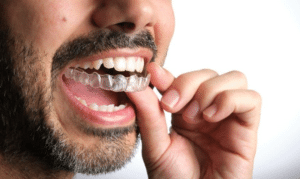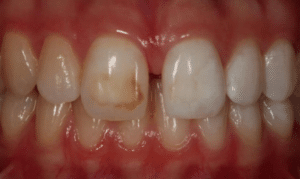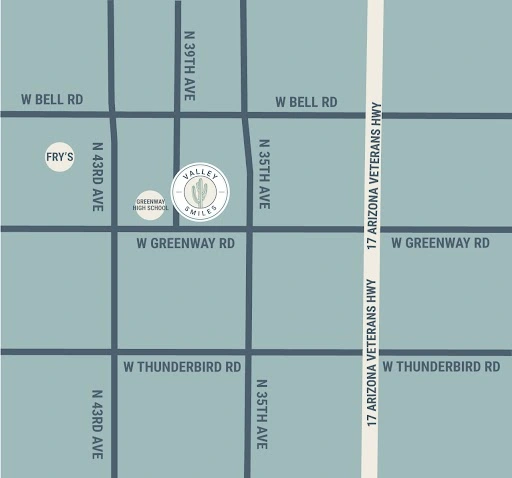“Cracked teeth can be a major pain in the mouth – not to mention, they can be costly to fix. From biting down on hard objects to dental injuries or just regular wear and tear over time, there are numerous reasons why you may develop a cracked tooth. In this post, we’re diving into the top 10 common causes of cracked teeth and sharing some simple prevention tips that will help keep your pearly whites intact for years to come.”
10 Common Causes of Cracked Teeth
Most people think of teeth as being strong and unbreakable. However, teeth can crack just like any other type of bone in the body. Cracked teeth are a common dental problem, and there are several different ways that they can occur.
One common cause of cracked teeth is biting down on hard objects. This can include hard candy, ice cubes, or even fingernails. Cracks can also occur from chewing on hard foods such as nuts or unpopped popcorn kernels. Biting your tongue or cheek can also cause a tooth to crack.
Another cause of cracked teeth is clenching or grinding your teeth (bruxism). This usually happens at night when you are asleep, but it can also happen during the day if you are under a lot of stress. clenching and grinding put a lot of pressure on your teeth which can eventually lead to cracks.
Tooth decay is another common cause of cracked teeth. When a tooth decays, it weakens and becomes more susceptible to breaking. A filling or crown that is not placed properly can also put undue pressure on a tooth and cause it to crack over time.
The best way to prevent cracked teeth is by taking good care of your oral health and avoiding habits that put your teeth at risk. Brush twice daily with fluoride toothpaste, floss regularly, and see your dentist for regular checkups and cleanings.
Bruxism (grinding)
Bruxism (grinding) is a common cause of cracked teeth. It can occur during sleep or wakefulness, and it often occurs in response to stress. Bruxism can lead to tooth damage over time, and it can also cause pain in the jaw and face. If you suspect that you may be grinding your teeth, talk to your dentist about ways to prevent tooth damage.
Chewing on Hard Foods
When you eat hard foods, you put a lot of pressure on your teeth. This can cause your teeth to crack. If you have cracked teeth, it is important to see a dentist right away so they can fix the problem. There are a few things you can do to prevent cracked teeth:
-Avoid eating hard foods
-Chew slowly and carefully
-Use toothpaste that contains fluoride
Poor Oral Hygiene
Your teeth are designed to last a lifetime, but they can be easily damaged. Cracked teeth are one of the most common dental problems, and there are several different ways they can occur. Poor oral hygiene is one of the most common causes of cracked teeth.
If you don’t brush and floss regularly, the plaque and tartar on your teeth will start to eat away at your enamel. This can make your teeth more susceptible to fractures and breaks. Brushing twice a day and flossing once a day is essential for maintaining healthy teeth and preventing damage.
In addition to poor oral hygiene, other common causes of cracked teeth include: clenching or grinding your teeth, trauma to the mouth, chewing on hard objects, and acidic or sugary drinks. If you think you may have a cracked tooth, it’s important to see a dentist right away so they can determine the best course of treatment.
Sports Injuries
There are a number of different ways that people can crack their teeth. One of the most common ways is through sports injuries. When you are playing a sport, you are at risk of taking a hard hit to the mouth which can lead to cracked teeth.
There are a few things that you can do to help prevent this from happening:
First, make sure that you wear a mouthguard when you are playing any type of sport. This will help to cushion your teeth and protect them from any blows.
Second, be careful with the types of food that you eat before and after playing sports. Hard candy or sticky sweets can cause your teeth to become more brittle and more likely to crack. Stick to soft foods and drinks like milk or water instead.
Finally, be sure to see your dentist regularly for checkups and cleanings so that they can keep an eye on your teeth and make sure that they are healthy.
Cavities and Tooth Decay
Cavities are one of the most common causes of cracked teeth. When a cavity forms, it weakens the tooth, making it more susceptible to cracking. Cavities are caused by plaque, a sticky film of bacteria that forms on teeth. Plaque produces acids that eat away at tooth enamel, causing cavities.
To prevent cavities and tooth decay, brush your teeth twice a day with fluoride toothpaste, floss daily, and visit your dentist regularly for checkups and cleanings.
Bruised Teeth and Jaw Injury
We all know that accidents can happen, whether you trip and fall or get hit in the mouth with a ball. And while we hope that nothing like that ever happens to us, it’s important to be aware of the potential consequences – namely, cracked teeth.
Cracked teeth can happen as a result of many different types of trauma, but there are some common causes that you should be aware of.
Preventing tip – Eating Hard Foods Not Properly Chewed:
Eating hard candy, ice, nuts, and popcorn are all great examples of foods that can crack your teeth if not properly chewed before swallowing. Biting into hard foods puts unnecessary stress on your tooth enamel which over time will cause cracks. To avoid this type of damage it
Temperature Changes & Acidic Drinks/Foods
When it comes to your teeth, temperature changes can cause cracks. When you consume acidic drinks or foods, the acidity wears away at your tooth enamel. This process is called “erosion.” Once the enamel is eroded, the underlying layer of your tooth, called dentin, is exposed. Dentin is softer than enamel and more susceptible to cracking.
Aging and Wear & Tear
As we age, our teeth are more susceptible to cracking and wear & tear. The enamel on our teeth begins to thin, making them more prone to damage. And, as we lose bone density in our jaw, our teeth can become loose and shift out of place. All of these factors can lead to cracks in our teeth.
There are a few things we can do to prevent cracked teeth as we age:
First, it’s important to keep up with good oral hygiene habits. This means brushing twice a day, flossing daily, and using mouthwash. These habits will help keep your teeth strong and healthy.
Second, you should see your dentist regularly for checkups and cleanings. This will help catch any problems early on before they turn into bigger issues.
Finally, if you do start to notice any cracks in your teeth, be sure to see your dentist right away so they can fix the problem before it gets worse.
Inadequate Dental Treatment
There are many reasons why people don’t receive the dental treatment they need. Perhaps they cannot afford it, or they live in an area where access to dental care is limited. Maybe they simply don’t believe that dental care is important. Whatever the reason, inadequate dental treatment can lead to cracked teeth.
Quitting smoking
Smoking is one of the leading causes of cracked teeth. The nicotine and other chemicals in cigarettes can weaken the tooth enamel, making it more susceptible to fracture. In addition, smoking can dry out the mouth and reduce saliva production, which can also contribute to tooth decay and other dental problems. If you want to protect your teeth, quitting smoking is one of the best things you can do.
By taking these precautions and getting timely dental treatment if needed, you can help keep your teeth healthy and avoid costly repairs down the road.





